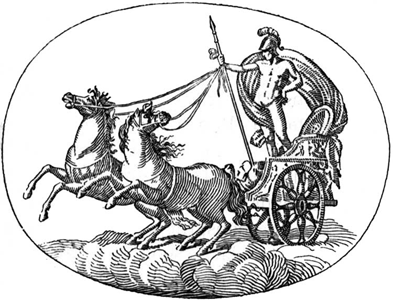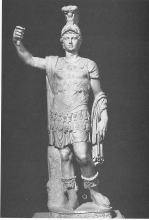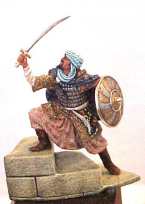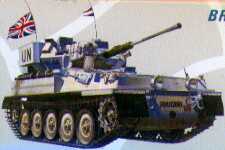"The Beginning of Sorrows" by Tricia Tillin
SEAL TWO: The Red Horse

And there went out another horse that was red: and power was given to him that sat thereon to take peace from the earth, and that they should kill one another: and there was given unto him a great sword.
Attributes:
- Red Horse
- Great Sword
- Violence, hatred,
- bloodshed
There is no difficulty identifying the characteristics nor the god behind this second seal. It is the god Mars, or "Ares" to the Greeks.
Many people see this second seal as that of WAR, only. Some say it denotes the "third world war". However, I think that is shortsighted and misses the nuances of what will actually happen. Like the horse and rider of the first seal, this is a spiritual being sent out with authority to provoke and incite a certain way of thinking or acting.
The red horse signifies the heat of rage, and the spilling of blood. From what Jesus said about this period, we can understand that men's hearts will be given over to hatred and violence, and that disturbances not only take place between nations, but within nations: "For nation shall rise against nation, and kingdom against kingdom" (Matt 24:7)
As we look at the Greek and Roman gods of war, we see that there's more to them than simply full-scale military attack on the battlefield.
Mars and Ares
1. ARES
In Greek mythology, the god of conflict and war was Ares. The Greeks thought very poorly of Ares, as did the other gods. He was vain, brutish and a bully. He is depicted in most stories as being outwitted and limping away defeated and humiliated from the field of battle. He was perhaps the least honored Greek God, seen as being spiteful, hateful, and petty.
- He was thought to be fickle in the battles he governed. It was believed that he would fight for either, or both sides, enjoying battle for the battle's sake, purely without a cause.
- Even Ares's father, Zeus, despises his own son: "Of all the gods who live on Olympus, thou art the most odious to me; for thou enjoyest nothing but strife, war and battles. Thou hast (an) obstinate and unmanageable disposition.''
- Ares is accompanied in battle by his sister, Eris, (the goddess of discord), and his sons, Deimos (fear) and Phobos (terror).
- Here we see that the spirit of war, whom Ares personaified, governed the human traits of rage, aggression, intolerance, cruelty, hatred, murder, and strife. His companions were discord and fear.
Therefore Seal Two is about much more than just "war"!
2. MARS
The Roman god of war, Mars, on the other hand, was the most respected of the Roman gods. He was believed to be the father of Remus and Romulus -- the founders of Rome. He is therefore, metaphorically, a founding father of Rome.
To the Romans, Mars did not rule just war. He also ruled agriculture and is often depicted leaning on his staff gazing at his cows in the field. He is also the god of spring, of fertility, and of growth.
Mars was highly respected by the Romans as their god of righteous warfare, as well as being considered one of their divine ancestors. Here he is shown in the dress of a Roman soldier. (Missing from his clenched fist is the warrior's sword that he held aloft.)
Mars was accompanied by his two companions Honos (honour) and Virtus (Virtue). Unlike Ares, his aggression was used honourably and virtuously, for noble advancement and expansion. He was assertive rather than cruel. The Romans thought it their destiny to rule and to expand Roman civilisation throughout the known world.
Mars is usually portrayed as a warrior in full battle armor, wearing a crested helmet and bearing a shield. His sacred animals are the wolf and the woodpecker, and his emblem is the spear or sword.
As their Founder, Mars was seen as the Protector of the city of Rome and Avenger of Rome's enemies. Instead of looking to God to protect and guard them, the Romans looked to Mars, and to the might of the sword. But those who live by the sword shall die by the sword.
Two Forms of Warfare
I don't think it is stretching things too much to see two forms of warfare portrayed here. In Ares we see the murderous rage and hatred that leads to the breakdown of society, with misrule, cruelty, guerilla warfare, terrorism, genocide, suicide bombing, and the kind of disorder that the Afghans and others have been suffering for decades under the Taliban rule.
In Mars we see the State machinery of military advance; defending what it sees as its rights and possessions, looking to its armies - trained and equipped to be the best in the world - to defend its cities and peoples. Mars represents organised warfare, the honour of "righteous warfare", in defense of the rule of law.
However, both of these god of war, Mars and Ares, combine in Seal Two to create a situation where "peace is removed from the earth". For whatever reason, men and women reach the end of their tether and begin to kill one another.
Not only that, but as this seal is broken, the red horse rider is given permission to unleash the violence lurking in the heart of man. We see increasing intolerance, impatience, rage, aggression, violence, and disorder of every kind.
THE RELIGION OF THE SWORD
In the current context of the war against terrorism, it might be pertinent to remind ourselves that the "Sword of Allah" represents their "Holy War to convert the infidel".
In an attempt to deal with the charge that Islam has always been a religion forced upon people by the sword, one website has this to say:
"If some one asks how can people be compelled in the truth when the mere fact of compelling indicates a the violation of the will of the one compelled? The first answer is that Allah sent Mohammad calling people to Him, showing the way to the truth, enduring much harm ... until the evidence of Allah's truth became manifest ... and His apostle became strong, He ordered him to call people by the sword ... hence there is no more an excuse after being warned. The second answer is that people first are taken and compelled, but when Islam becomes prevalent ... and they mix and make friends ... their faith strengthens and finally becomes sincere."
According to the above:
1. Muslims believe that they have the right to compel people to accept Islam because it is the truth.
2. Muslims believe that Mohammad was given a divine command to fight against people, not in self defense or for economical or political reasons, but because people do not worship the one Mohammad worshipped.
3. The above scholar had no value for the human free will. To him, forcing Islam on people is justified if later on they will become Muslims. It is not an exaggeration then to say that the sword is Allah's final word.
[from http://debate.domini.org/newton/tolerance.html]
The image of the Great Sword, seen so prominently in Seal Two, has for centuries been associated with Islam. Their religion and flag has the symbol of the crescent moon which some say is the ancient Arabian moon-god "Sin" now worshipped under the name "allah" 
But this crescent moon is also symbolised in the curved sword of the Saracens - Muslim invaders who sought to eradicate the Christian armies of the Western world. The scimitar is an image that summarises all that Seal Two has to say to us.
But while perhaps the Greek god Ares represents the brutality and mayhem of Muslim armies, the Roman god Mars represents Westernised warfare which sees itself as honourable and just.
Nonetheless, both were gods of WAR! Whether the hate-driven, chaotic and almost random bloodshed of terrorist attacks or the organised military machine of the West, both are wielding the sword and both are setting in motion the spirit of violence characterised by this rider on the red horse.

The scimitar may be the curved sword of the Muslim armies, but let's not forget that it's also the Scimitar TANK of the western forces!
The Sword of Judgement
The bible uses the image of the sword in spiritual as well as literal terms. Jesus comes with a "sharp sword" that "proceeds out of his mouth" that with it he should "smite the nations" (Rev 19:15)
And "In that day the LORD with his sore and great and strong sword shall punish leviathan the piercing serpent, even leviathan that crooked serpent; and he shall slay the dragon that is in the sea." (Isa 27:1) See also Isa 49:2/ II Th 2:8 and Rev 2:16.
The sword is therefore not only a physical weapon, but the weaponry of words, whether for good or evil. Jesus comes proclaiming God's word, which brings mankind to judgement and punishes the wicked.
But the devil also has his word in the endtimes. Propaganda, false teachings, incitement to hatred, curses, lies and evil proclamations - these are also the sword that the devil uses in his attempt to destroy God and his people.
With the opening of Seal Two we see a rise in these things also. We see a "war of words" and ideologies. We see hatred and violence breaking out. We see peace taken from men's hearts and from the earth, in preparation for the ultimate rebellion against God at Armageddon.
TO CONTINUE: Click on the next in the series:
- SEAL THREE - Famine and Freemasonry
- SEAL FOUR - Death and Hades
- CONCLUSION - Things to Come
